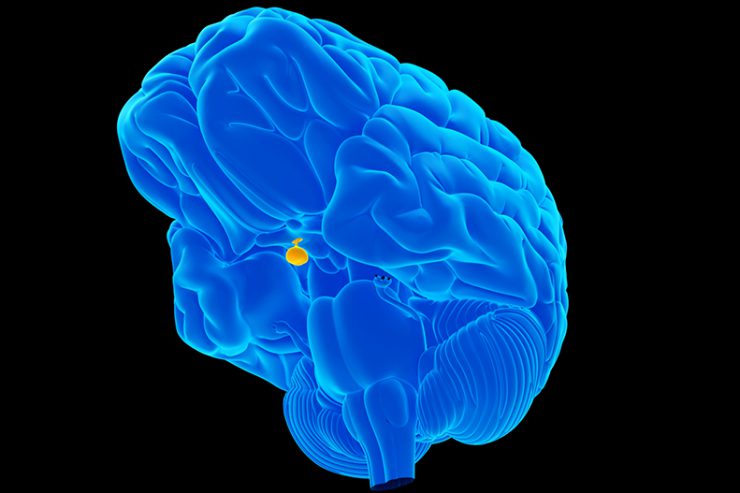You’ve probably heard a lot about hormones and how they control many functions of your body. But what controls your hormones?
What Controls Hormones in the Body?
Different glands in your body control the production and release of numerous hormones. These glands are all part of your endocrine system.
The most important is the pituitary gland.
Never Miss a Beat!
Subscribe to Our HealthBeat Newsletter!
Thank you for subscribing!
You can now select the specific newsletters you'd like to receive.
You are already subscribed.
Subscribe to more newsletters in our email preference center.
Sorry, an error occurred. Please try again later.
Get Healthy Tips Sent to Your Phone!
What is the Pituitary Gland?
The pituitary gland is a pea-sized structure found at the base of your brain, just below the hypothalamus. The pituitary is also called the master gland. That’s because it produces hormones that stimulate the other glands in the endocrine system, such as the:
- Kidneys
- Ovaries
- Thyroid
- Testes
The pituitary gland sends out hormones based on hormonal or electrical signals from the hypothalamus.
What Does the Pituitary Gland Control?
The master gland releases numerous hormones that control body functions.
- Growth hormone (GH) – controls the growth and size of muscles and bone.
- Thyroid-stimulating hormone (TSH) – stimulates the thyroid gland to release hormones, such as those that control metabolism.
- Adrenocorticotropic hormone (ACTH) – stimulates the adrenal glands, which produce hormones with effects similar to steroids.
- Follicle stimulating hormone (FSH) – keeps the ovaries and testes working properly by stimulating follicle production in the ovaries and sperm production in men.
- Luteinizing hormone (LH) – works with FSH and stimulates estrogen in women and sperm production in men.
- Prolactin – stimulates breast milk production.
- Antidiuretic hormone (ADH) – prompts the kidneys to absorb more water in the blood and causes you to urinate less.
- Oxytocin – stimulates uterine contractions for childbirth and milk production.
What Can Go Wrong with the Pituitary Gland?
With the pituitary gland having such important functions, it can be a big deal when you have a problem.
The most common disorder is a pituitary tumor. The good news is these are usually benign, meaning not cancerous. Some of the disorders associated with the pituitary gland include:
- Cushing’s Syndrome – Cushing’s occurs when a tumor on the pituitary gland causes it to create too much ACTH hormone, raising blood cortisol levels.
- Empty Stella Syndrome – This disorder is indicated by a bony structure that forms around the pituitary gland at the base of the brain, which can lead to impotence, irregularity in menstruation, or a reduced sexual desire.
- Hypopituitarism – This disorder is also called underactive pituitary gland and can affect hormone production in other endocrine organs like the thyroid, testes, ovaries, or adrenal gland.
- Acromegaly – This disorder is often caused by benign tumors on the pituitary gland that cause it to overproduce growth hormones.
- Tumors – Most pituitary tumors are benign but if they grow large enough, they can put pressure on the optic nerve of the eye or cause the pituitary gland to overproduce hormones, putting the body out of balance.
What are the symptoms of a pituitary disorder?
Because the pituitary gland is often affected by tumors, the symptoms of a pituitary disorder can depend on the size and location of the tumor. These symptoms are common among pituitary disorders:
- High blood pressure.
- Changes in vision.
- Unexplained weight gain.
- Hair loss.
- Low energy.
- Low sex drive.
- Irregular menstrual cycles.
- Diabetes.
- Anxiety or depression.
- Stunted growth.
How Do I Keep My Pituitary Gland Healthy?
Noncancerous tumors are the main cause of pituitary disorders, so the best way to take care of your pituitary gland is to protect your head. Here are a few ways you can protect yourself:
- Wearing a helmet while skiing, cycling, or driving a motorcycle.
- Wearing a seatbelt at all times in a moving vehicle.
- Performing exercises that focus on balance, stability, and preventing falls.
Can You Live Without a Pituitary Gland?
It is possible to live without a pituitary gland.
However, because the pituitary gland is so vital in hormone production and regulation, you would have to take daily medications to replace this organ’s function. For that reason, doctors focus on preserving the pituitary gland in most cases.
When Should I See my Healthcare Provider About My Pituitary Gland?
You should talk to your doctor about your pituitary gland health if you are experiencing the symptoms of hormonal imbalance or have recently experienced a traumatic brain injury. However, the most common cause of a pituitary disorder is a benign tumor.
Symptoms of a tumor can vary widely depending on how hormone production is affected and what hormones are changed. Sometimes a tumor causes no symptoms and doesn’t affect hormone production.
Headaches, changes in menstrual cycle, and lower sex drive may be signs something is not right with your pituitary gland. Always bring up concerns to your doctor.
Editor's Note: This article was originally published on , and was last reviewed on .
About Neurosurgery
The UPMC Department of Neurosurgery is the largest academic neurosurgical provider in the United States. We treat conditions of the brain, skull base, spine, and nerves, including the most complex disorders. We perform more than 11,000 procedures each year, making our team one of the most experienced in the world. Whether your condition requires surgery or not, we strive to provide the most advanced, complete care possible. Our surgeons are developing new techniques and tools, including minimally invasive treatments. Find an expert near you.
